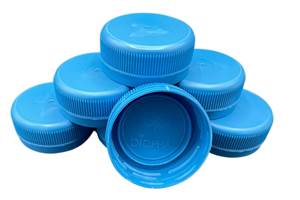Cork Compounds for High Strength, Low Weight Performance Composites
Amorim Cork Solutions enable bio-based designs for injection molded products.
is well known for producing cork stoppers for wine, which it has been doing since 1870. In 2018, the company started up its i.cork pilot factory in Portugal to design new materials and develop technologies. The program has led to a recycled material application for leftovers of wine stopper manufacture as well as postconsumer materials, which are incorporated into Amorim’s cork polymer compounds.
The company has found that cork, which is comprised of natural polymers such as suberin and lignin, can be used to offset as much as 70% of synthetic polymer content in some consumer product applications. Cork material can be compounded with three families of polymers: prime (PP, PE, TPU), recycled (PP & PE), and even bio-based (PLA, bio-HDPE, thermoplastic starch) for an all bio-based composite. The resulting cork polymer compounds (CPCs) are compatible with injection molding, blow molding and thermoforming with standard equipment. Converters of traditional polymer compounds should need no new investment in additional processing equipment or tooling to transition to the use of CPCs.

Amorim cork polymer compounds. Source: Amorim Cork Solutions
The product line originated from Moutinho’s research, which investigates the effect of compounding cork with bioplastics. A 2023 paper in the journal , authored by Moutinho along with Eduardo Soares and Martinho Oliveira, describes experimentation with the injection molding of expanded cork polymer composites produced with PLA, cork powder and expandable microspheres (EMS) used as a blowing agent. Results showed reduced density and lower crystallization temperatures compared with PLA controls.
“Adding cork to the compound increases the crystallinity of the polymer matrix, acting as a nucleating agent,” Moutinho says. The increase in crystallinity of the polymer compound enables higher tensile and flexural strength, modulus and impact resistance, along with thermal and chemical resistance.
Due to the natural resilience of cork, the compounds are suited for applications which require shock absorption such as footwear and sporting goods. Sound absorption is another property beneficial for some applications.
An Amorim cork-based composite with potato starch polymer was used to fabricate part of a modular household storage system called Jack & Jenny. in Switzerland designed the storage system with a goal of making the product as sustainable as possible. Requirements stipulated the product had to be washable, sturdy and biodegradable. “I explored various options including PET felt, bioplastics and recycled plastics. However, each presented challenges — I wanted something entirely eco-friendly, and CPC met all my requirements,” says Julien Garnier, industrial designer at Puzz’le.

Modular storage container molded by Codil from a composite of cork and potato starch polymer developed by Amorim. Source: Jean Luc Adranasolo
According to Garnier, the process of developing customized injection molding techniques for the CPC material took time, and the instrumental collaboration and expertise of both Amorim and injection molder .
“The material choice ensures a minimalist environmental footprint while maintaining high quality and functionality,” Garnier says. “It also gives the product a distinctive aesthetic, visually highlighting its natural origins.” The Jack & Jenny design won an in March.
Related Content
Best Practices for Purging PHA and PHA/PLA Blends
Because bioplastics are processed at lower temperatures, purging between jobs requires a different process and purging agents than those applied for traditional resins.
Read MoreHow Yeast Could Give Rise to Bioplastic
Researchers work to scale up a biomanufacturing process for succinic acid, an important building block for industrial chemicals and a biopolymer precursor.
Read MorePHA Compound Molded into “World’s First” Biodegradable Bottle Closures
Beyond Plastic and partners have created a certified biodegradable PHA compound that can be injection molded into 38-mm closures in a sub 6-second cycle from a multicavity hot runner tool.
Read MoreMasterbatches Reduce Gloss in PLA and PETG 3D Printed Products
Insight Polymers & Compounding’s two low-gloss additive masterbatches shown to boost appearance of 3D printed objects.
Read MoreRead Next
For PLASTICS' CEO Seaholm, NPE to Shine Light on Sustainability Successes
With advocacy, communication and sustainability as three main pillars, Seaholm leads a trade association to NPE that ‘is more active today than we have ever been.’
Read MoreBeyond Prototypes: 8 Ways the Plastics Industry Is Using 3D Printing
Plastics processors are finding applications for 3D printing around the plant and across the supply chain. Here are 8 examples to look for at NPE2024.
Read MoreMaking the Circular Economy a Reality
Driven by brand owner demands and new worldwide legislation, the entire supply chain is working toward the shift to circularity, with some evidence the circular economy has already begun.
Read More












